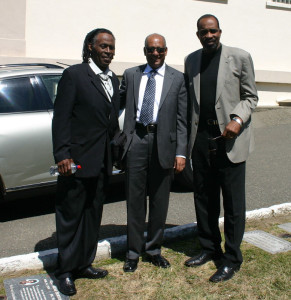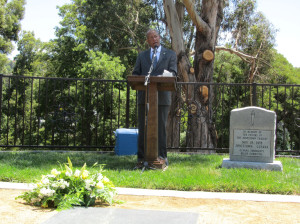I wish to express my appreciation to Mr. Fielding McGehee and his fellow organizers for their kind invitation to make a few remarks at this Jonestown Memorial Dedication Service. I also wish to specially thank Charles Krause, a miraculous survivor, for his warm introduction and for forging the connections which have enabled my attendance here today.
The world has come to regard the Jonestown events as a catastrophe so unconscionable that it has defaced humanity. Today you are memorializing those who have been laid to rest. But they were hardly the only ones to have been affected by the occurrences at the Jonestown commune, the Port Kaituma airstrip and Lamaha Gardens in Georgetown. Trauma, emotional suffering and stigmatisms have also been visited upon the innocent survivors of the tragedy and family members of the victims. Indeed, the Jonestown event continues to captivate the imagination of the world and perpetuate a blemish on the images of both the United States and Guyana. Fortunately, in spite of the disturbing nature of the occurrences, they have failed to adversely affect the friendly relations which have always existed between the people of Guyana and the people of the United States.
Americans often ask me where was I and what was I doing at that time. On the day following the disaster, I showed up for work at the radio station in Georgetown. Part of my job was to read the news and I was among the first persons to deliver information about the events to the Guyanese public. Guyana, as you know, is a relatively young country, having celebrated our 45th anniversary of Independence just last Thursday. In 1978, there was no television service and the public information system was under a restrictive regime of state control.
Unbeknown to me, the news items which had been prepared for broadcast had been devised to conceal the enormity of the tragedy from the Guyanese public. Being none the wiser, I was really misleading radio listeners by vastly understating the actual number of victims of the tragedy. Obscuring the true facts from the Guyanese public was facilitated by the remote location of the Jonestown commune from any populated areas. However, this sham was quickly exposed. Overseas telephone calls began informing people about the reports from the international media. The authorities in Guyana were then obliged to release more accurate information to the population bit by bit.

To the people of Guyana, those sad occurrences were totally alien to them and completely divorced from their reality. The average citizen had had no idea that such a place like Jonestown existed in their own country. The Guyanese people viewed the incident primarily as a humanitarian calamity. After the shocking truth had been exposed, a sentiment of great anguish at the loss of so many lives, and feelings of sympathy for the victims, swept over the nation. I have come here today to reiterate those condolences. I join you in the expectation that the Memorial which you are dedicating today would provide a measure of closure and catharsis for those who continue to be victimized as well as to help erase the undeserved stigma which many of you, just like the people of Guyana, have endured for these past 33 years.
The events occurred at a time when the prevailing international realities, in tandem with the local conditions created by a dictatorial political system, provided a context for the Peoples Temple Agricultural Project to organize and operate within our borders with impunity. Guyanese vividly recall that period as a difficult time in our history. It was a season when the results of national elections were falsified, human rights were trampled and demonstrations in favour of political freedoms were quelled by violence. Although it has never been confirmed that any Guyanese citizen participated in the Jonestown events, either as perpetrator or as victim, it is beyond dispute that the country’s political leadership at the time was compromised and there was an absence of appropriate security guarantees.
While monuments, memorials and mere words would never assuage the depth of hurt and grief, it is worth mentioning that our two countries have both learnt their lessons. Today, such a disaster would be much more easily prevented. But more importantly, Guyana is now a different country. Guyanese have now broken the shackles of political oppression and have developed a forward-looking and modern society. Today, our nation is recognized for its bold and innovative strategies for growth and development within a stable and democratic framework. The survivors who are here today have borne witness to the country’s breathtaking natural beauty, its abundant resources and the unparalleled reputation of its people for warmth, generosity and genuine hospitality to all those who visit its shores. It was chosen over other locations because the Peoples Temple believed that Guyana offered its members a safe and peaceful place to live.
Just as you are doing here today, Guyana is turning new pages on this dark chapter in our past and is rising to face new heights. Even as we all bow once more today in remembrance of the victims of the tragedy.
I thank you.
